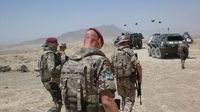In a stark warning to political leaders, André Wüstner, the chairman of the Bundeswehr Association, has highlighted critical personnel shortages facing Germany's armed forces, known as the Bundeswehr. Speaking on April 3, 2025, Wüstner cautioned that without a significant increase in personnel, the Bundeswehr risks "imploding" under the pressure of increasing demands and diminishing resources.
Wüstner's comments come amid ongoing coalition negotiations between the Union and the SPD (Social Democratic Party), where disagreements persist over the potential reinstatement of compulsory military service. He stressed that the personnel issue has not been recognized as a strategic challenge in the current draft of the coalition agreement. "The topic of personnel for the Bundeswehr has not yet been recognized as a strategic challenge and has not been named accordingly in the draft of the coalition agreement," Wüstner stated.
As the Bundeswehr grapples with an acute personnel crisis, recent statistics reveal a troubling trend. The number of soldiers has dwindled to approximately 181,150, down from 183,050 at the end of 2022. This decline is compounded by an aging workforce; the average age of soldiers has risen from 32.4 years in 2019 to 34 years by the end of 2024. Wüstner emphasized that this demographic shift poses significant challenges for the future operational readiness of the military.
In his remarks, Wüstner underscored the urgency of addressing the personnel shortfall. He warned, "If no significant personnel increase is achieved in the coming years, the Bundeswehr will implode! More and more tasks for fewer and fewer soldiers lead to a vicious cycle from which the Bundeswehr can hardly escape." His call to action reflects a growing concern among military leaders regarding the sustainability of Germany's defense capabilities.
The Union party advocates for overturning the suspension of compulsory military service, a decision made in 2011. In contrast, the SPD maintains a commitment to voluntary service, emphasizing the need for a societal discussion about a new military service model. Wüstner supports the SPD's acting Federal Minister of Defense, Boris Pistorius, who has proposed a new military service model that would require young men to declare their willingness and ability to serve. Wüstner stated, "In any case, the registration and conscription planned by Boris Pistorius should begin this year."
Wüstner's advocacy for a new form of compulsory military service echoes sentiments from other defense experts, who argue that such measures are necessary for maintaining a robust military presence. He noted that without a new form of conscription, comparable to models used in other countries like Sweden, Germany's ability to bolster its defense forces will be severely hindered.
Furthermore, Wüstner highlighted the broader implications of the personnel crisis, which extend beyond recruitment issues. He pointed out that the Bundeswehr must also address technological modernization and adapt to emerging threats, including cyber warfare and hybrid threats. "The Bundeswehr must be capable of responding to hybrid threats and cyberattacks, which requires comprehensive rearmament and training," he explained.
As the Bundeswehr navigates these challenges, Wüstner called for a strategic realignment that goes beyond mere budget increases. He remarked, "A rising defense budget is a good foundation, but it does not guarantee success. Those who want to succeed in the coming years must think more 'out of the box,' need courage for real course corrections, and must not fear sometimes disruptive processes."
Wüstner's comments resonate with a growing sense of urgency within the military community. He pointed out that many soldiers and civilian employees are losing faith in the Bundeswehr's ability to become an efficient and effective organization. "It is no longer enough to tinker with symptoms; we must address the root causes of all problems: overregulation and centralization, which paralyze the entire country and especially the armed forces," he warned.
In light of NATO commitments, Wüstner mentioned that the Chief of Defense has indicated a need for 460,000 soldiers and reservists. He noted that experts project an additional personnel requirement of 35,000 to 45,000 personnel in the army alone over the next decade, emphasizing the pressing need for action.
As negotiations between the Union and SPD continue, the question of how to effectively address the personnel crisis remains at the forefront of discussions. Wüstner's warnings serve as a clarion call for political leaders to recognize the strategic importance of military personnel and to take decisive action to secure Germany's defense capabilities for the future.
The Bundeswehr Association, representing the interests of around 200,000 soldiers and civilian employees, is advocating for a comprehensive approach to reform that addresses both personnel shortages and the modernization of the armed forces. Wüstner's remarks reflect a broader consensus that without immediate and effective measures, the future of Germany's military readiness hangs in the balance.
In conclusion, the ongoing debate surrounding the Bundeswehr's personnel challenges highlights the urgent need for a strategic response. As Wüstner aptly noted, the time for fundamental reforms is now, and the consequences of inaction could be dire for Germany's national security.









